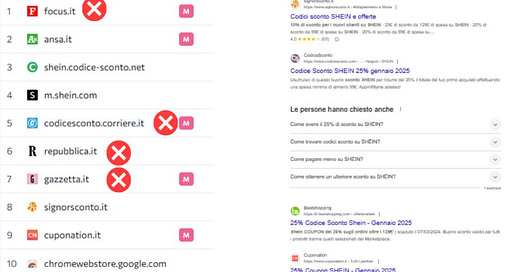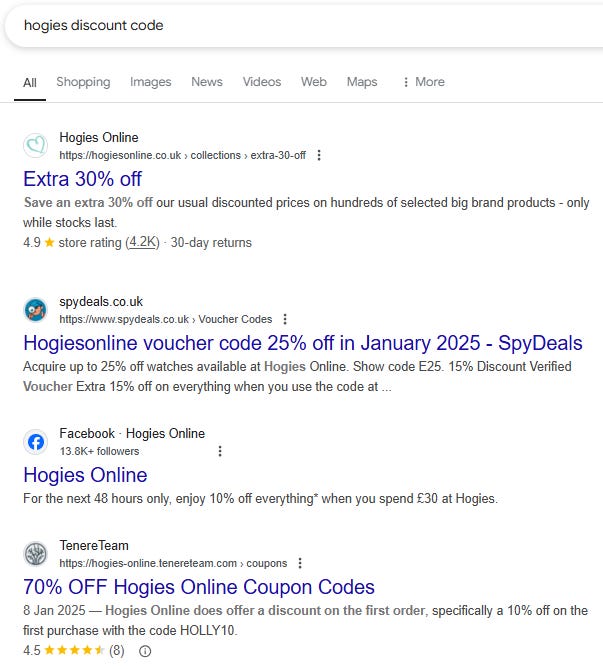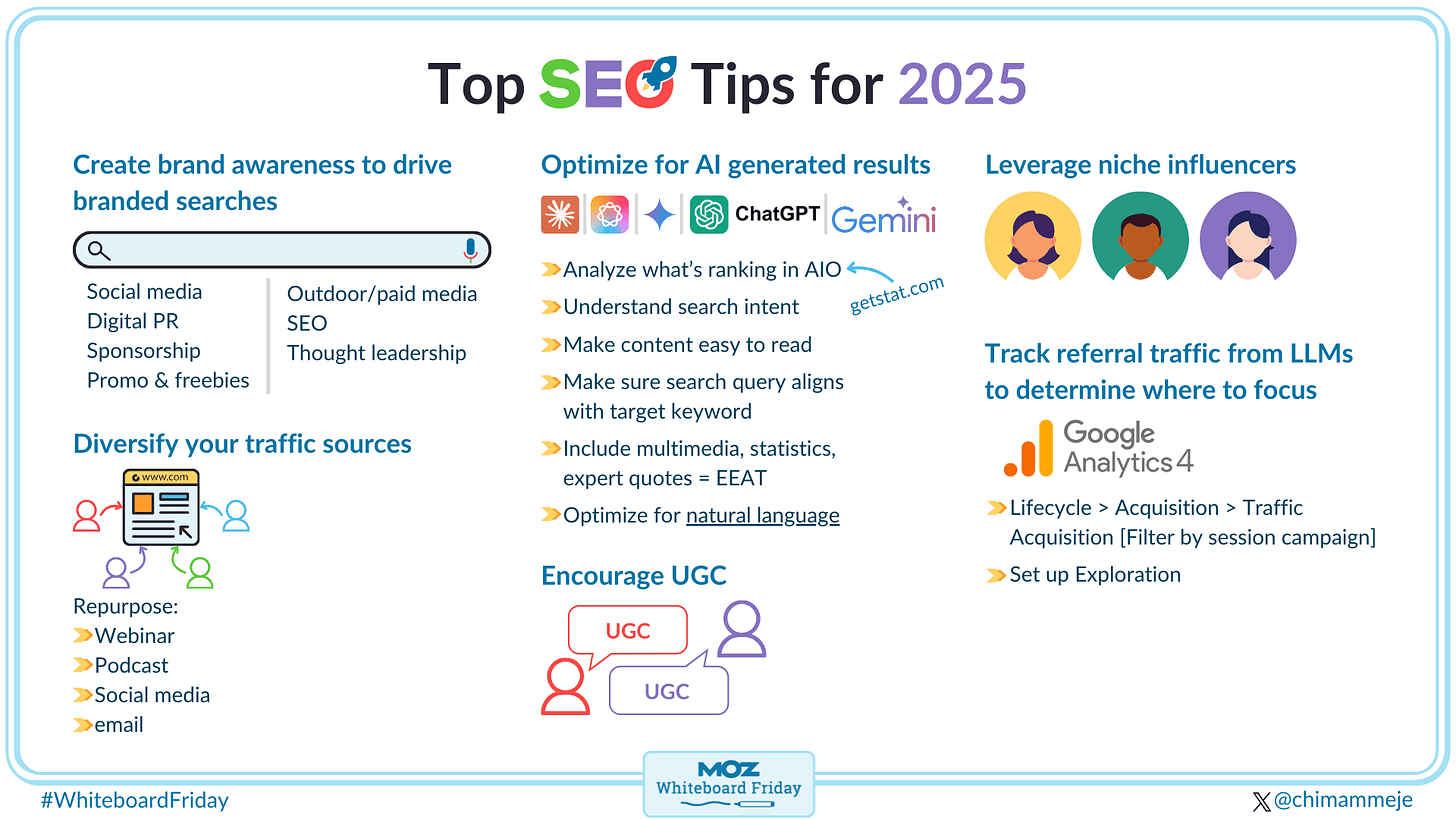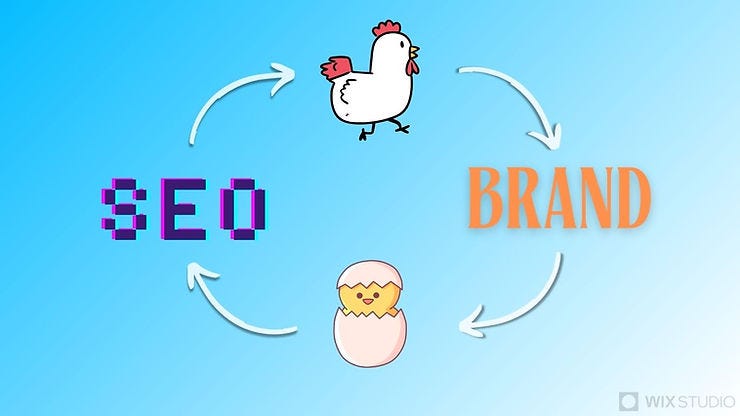How SEO Can Harm Your Site, Site Reputation Abuse Expansion, AI Agents & More
SEO TL;DR #56 27/01/2025
Technical SEO
Google Expands Site Reputation Penalties to Europe
Google has extended its enforcement of the site reputation abuse policy by issuing a wave of manual penalties to European sites. I covered sites hit by the first wave in November, including Forbes and the Independent.
Many coupon-related sites in Europe seem to be among the hardest hit, as reported by Laura Chiocciora on X.
💡 Takeaway. I see this as an opportunity for brand sites to take back control of organic listings. Instead of allowing third-party deal sites to benefit from branded, deal-related searches, create your own dedicated discount page like in this example with Hogies.
You automatically benefit from being the brand, which helps click-through rates, and when users look for discounts on your products, they land on your site directly. This increases the chances of driving more traffic, gaining newsletter subscribers and improving conversions.
Content SEO
Google Updates Search Quality Raters Guidelines with a Focus on Spam
Google has updated its Search Quality Raters guidelines, with the main changes focusing on spam-related content. Updates include more precise guidance on low-quality pages, expanded details on assessing user intent, and fresh examples to help raters better evaluate content.
💡 Takeaway. While quality raters don’t directly impact rankings, their feedback helps refine Google’s algorithms, making this the prime time to review the guidelines and ensure your site prioritises valuable, people-first content.
It’s a beast of a document at 181 pages, but it offers some excellent insights into what Google looks for when ranking sites. My tip is to upload the PDF as a reference source in the likes of Notebook LM or GPT and use it within your prompts, e.g.
“How can I adjust this content to align with Google’s quality rates guidelines?”
“Write a content brief on this topic, with these guidelines in mind.”
Technical SEO
Google Warns That “Doing SEO” Can Cause More Problems
I like John; he keeps us SEOs on our toes and calls BS where he sees it. The post here on Bluesky is a prime example of this. Now, I’m not saying SEO tools are all bull, but I think what John’s getting at here is the kind of SEO advice that some of these tools churn out.
💡 Takeaway: fixing issues you export from a crawl won’t do any harm, but they’re unlikely to do wonders for your website in solidarity, especially when there are more likely bigger things to go after! Some examples of things which an SEO tool might suggest that could be hurtful
The removal of “toxic backlinks”. Some of the links flagged in these audits might be fundamental to how Google understands your website.
Adding “target keywords”. Littering your content with keywords and making it harder to read is typically a bad idea. I see a lot of magical AI copywriting tools that destroy readability for the sake of “getting the right keywords”.
Increasing your word count. Tools might suggest that the top 10 results are averaging 1,673 words in length, so this is what you should aim for. They fail to factor in the 100s of other signals at play. I always favour being concise text over verbose.
Creating separate pages for every keyword variation. Tools may suggest creating pages for minor keyword differences, like “best red shoes” and “red shoes best deals.” This only leads to thin, partially duplicate content and keyword cannibalisation issues. A single, well-optimised page can rank for multiple variations.
Redirecting all of your “thin content”. Opposite to the above (yes, there’s nuance!), some tools suggest redirecting or deleting all pages deemed “thin” without considering their value. For example, pages with minimal text might still drive traffic or serve a purpose for users, such as an FAQ page with concise answers.
Add ALL of the backlinks. Blindly pursuing the highest number of backlinks can provide negative signals, such as link farms or spammy directory links. Quality and relevance matter far more than sheer volume.
UX
Google Drops Breadcrumbs from Mobile Search Results
Google has removed breadcrumbs from mobile search results, which are now showing only the domain name instead. Desktop search results will continue to display both the domain and breadcrumb.
Google stated this change aims to create a "cleaner, more streamlined look" for mobile users globally, across all languages and regions.
💡 Takeaway: There’s not much to action here, but it hopefully stops people obsessing over the perfect URL (for mobile, at least).
I still see people changing URLs - sometimes without redirecting them - to get in a particular word or phrase, hoping this will help click-through rate. If most of your traffic comes from mobile, at least we now know that URL manipulation has zero impact on CTR.
AI X SEO
Chat GPT & Perplexity’s New AI Agents
Over the last week, we saw two new AI agent demos: ChatGPT’s Operator and Perplexity - AI agents that can do things on the web for you. This is in response to Google’s Project Mariner, which I covered with the release of Gemini 2.0.
These tools can perform tasks like searching, clicking, scrolling, and navigating the web. Currently, they’re both for pro subscribers and designed to handle web interactions without custom API integrations.
💡 Takeaway. This doesn't signal the end of SEO but a shift in who we’re optimising for. With AI agents like Operator potentially driving more automated traffic, websites will need to prioritise clean, straightforward navigation and accessible content for AI crawlers to interpret.
Sites with well-optimised headings, schema markup, and user-friendly design will be better positioned for AI-driven engagement - which thankfully also helps humans!
What I Read Through The Week
Top SEO Tips for 2025 - Whiteboard Friday
Some great tactics and things to look out for in 2025 from Chima Mmeje. These align perfectly with what I believe will be the focus for 2025, especially around diversifying your traffic and optimising for AI Agent.
Does brand support SEO or does SEO support brand?
Mordy Oberstain from WIX argues that brand building should come before SEO and that SEO is not an effective way to build a brand. He highlights the importance of a foundational phase, which includes establishing a brand's identity & market positioning. Then, it’s on to the momentum phase, where SEO comes into play: topic focus, asset creation, and community engagement.
Learn 80% of NotebookLM in Under 13 Minutes!
The title says it all! I don’t know how I’ve only just discovered Jeff Su’s channel, but it’s packed with helpful guides on incorporating AI into your routine, spreadsheet tips and all sorts of productivity hacks.













Your takeaways are much appreciated!
Hi! I’d like to ask you a question. I’ve noticed that several European Substack subdomains have experienced severe penalties since January 21, when site reputation abuse enforcement was expanded to Europe. In many cases, GSC has shown the deindexing of most content that was already online and generating clicks from the SERP. However, no manual actions have been reported in the same accounts.
Have you noticed similar situations as well? I’m concerned that site reputation abuse may have also affected Substack’s subdomains.
Thank you